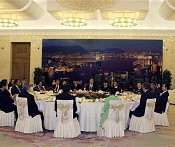VOA标准英语10月-East Asian Countries to Create $80 Billion Fund t(在线收听)
 |
| Chinese Premier Wen Jiabao, center, speaks at start of breakfast with Asian leaders at Great Hall of People in Beijing, 24 Oct 2008 |
Leaders from East Asian countries agreed Friday to have the fund set up by the middle of next year.
Members of the Association of Southeast Asian Nations, Japan, China, and South Korea will be allowed to dip into the money when faced with a financial emergency.
Japan, China, and South Korea agreed to provide 80 percent of the funds, and Southeast Asian nations will give the rest.
Tim Condon is chief economist and head of research for Asia in the Singapore offices of investment bank ING. He says if it materializes the fund could be a sizable boost for Asia's financial markets.
"The pressure they're under now I think is more related to just a panic, the ongoing panic in financial markets. And, I think, the thinking is the $80 billion could be used as sort of a backstop for the regional authorities, that when they do experience pressure, to fend it off," he said.
Condon says countries such as South Korea, where bank lending has been rapid, would see particular benefit from the fund.
He says there is little else Asia can do as a region to fend off the effects of slowing global demand.
"It's very difficult, I think, in the current environment," he said. "Asia is an emerging market region and the overwhelming sentiment in financial markets today is to reduce risk. And, emerging market assets are risky."
Support has been growing for an Asia monetary fund as the financial crisis has hit the region's export industries.
The leaders of the 13 countries met early Friday in Beijing before the start of the Asia-Europe Summit. The summit with European leaders also is likely to focus on the global financial crisis.
The East Asian fund will replace an existing, mainly bilateral currency swap mechanism called the Chiang Mai Initiative.
Asian leaders also agreed to improve monitoring of the region's financial market by creating an independent surveillance organization.
The global financial crisis, which began with massive defaults on home loans in the United States, has spread rapidly as bank lending has dried up and consumer spending had dropped.
Nations have been unveiling emergency spending plans and loan guarantees to prop up investor confidence but financial markets remain volatile.